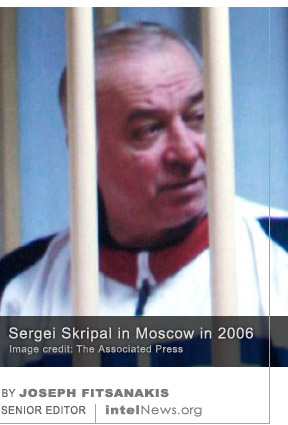
Britain’s counterintelligence service is nearing the conclusion that a foreign government, most likely Russia, tried to kill a Russian double spy and his daughter, who are now fighting for their lives in a British hospital. Sergei Skripal, 66, and his daughter Yulia Skripal, 33, are said to remain in critical condition, after falling violently ill on Sunday afternoon while walking in downtown Salisbury, a picturesque cathedral city in south-central England. Skripal arrived in England in 2010 as part of a large-scale spy-swap between the United States, Britain and Russia. He was among four Russian citizens that Moscow released from prison and allowed to resettle in the West, in exchange for 10 Russian deep-cover intelligence officers, who had been arrested earlier that year by the Federal Bureau of Investigation in the United States.
Since Skripal’s poisoning made headlines on Monday morning, the basic details of his story have been reported extensively. He is believed to have served in Soviet and Russian military intelligence for several decades, rising to the rank of colonel. But in 2004 he was arrested and eventually convicted by Russian authorities for spying on behalf of the British Secret Intelligence Service (MI6). He had served nearly 7 years of a 13-year sentence in 2010, when he was pardoned by then-Russian President Dmitry Medvedev and allowed to resettle in England with his immediate family. He did so in Salisbury, where he was found in a near-fatal state last Sunday, slumped on a street bench next to his equally catatonic daughter. Inevitably, the story brought back memories of the assassination of Alexander Litvinenko, a former officer in the Soviet and Russian intelligence services, who defected to Britain but was poisoned to death with a radioactive substance in 2006. His murder prompted London to expel four Russian diplomats from Britain, a move that was countered by Moscow, which also expelled four British diplomats from the country.
Despite the close parallels between Litvinenko and Skripal, the British government has not publicly blamed Russia for Sunday’s attempted killing. But according to The Times newspaper, officials at the Security Service (MI5), Britain’s counterintelligence agency, are already pointing to Russia as the culprit of the attempt on Skripal’s life. The London-based paper cited anonymous sources in Whitehall, the administrative headquarters of the British government, who said that MI5 experts were already briefing government officials about the details of the assassination attempt by Russian government agents.
Actions taken by the British government in the past 24 hours also point to Whitehall viewing the attempt on Skripal’s life as an operation sponsored by a state, most likely by Russia. The investigation of the incident is now being led by the counterterrorism branch of the Metropolitan Police Service in London. Additionally, samples of the victims’ tissue, as well as blood and other bodily fluids, have been sent for examination by toxicologists at the Ministry of Defence’s top-secret Science and Technology Laboratory in Porton Down. It also emerged last night that British Home Secretary Amber Rudd has called an emergency meeting of the British government’s Cabinet Office Briefing Rooms (COBR, also known as Cobra) group, which she chairs. The group consists of cabinet ministers, senior civil servants, and the leadership of the Metropolitan Police and the intelligence services, who meet to respond to developing emergencies of a national scale.

No comments:
Post a Comment